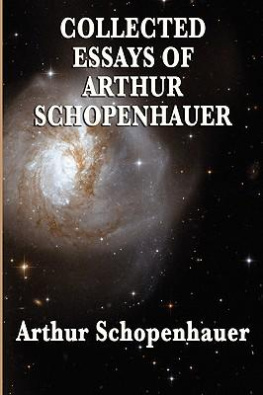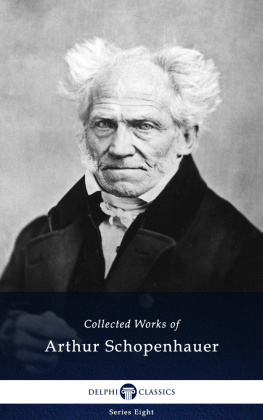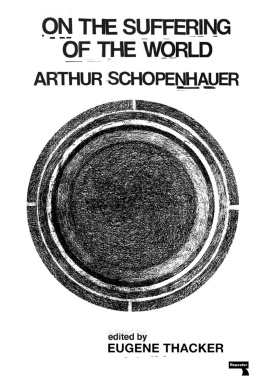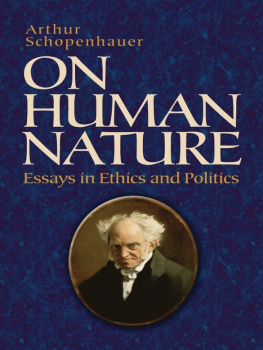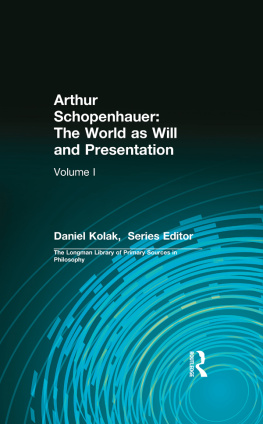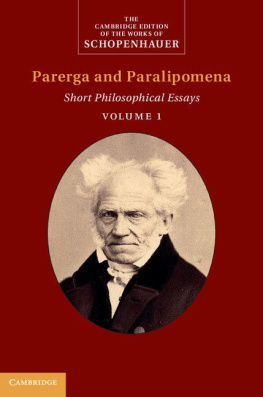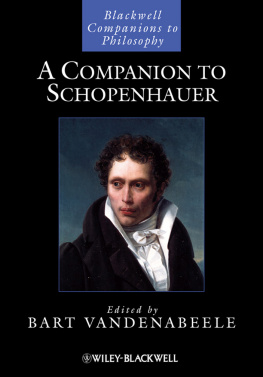THE COLLECTED ESSAYS OF ARTHUR SCHOPENHAUER
By Arthur Schopenhauer
Contents
PRELIMINARY.
When Schopenhauer was asked where he wished to be buried, he answered, "Anywhere; they will find me;" and the stone that marks his grave at Frankfort bears merely the inscription "Arthur Schopenhauer," without even the date of his birth or death. Schopenhauer, the pessimist, had a sufficiently optimistic conviction that his message to the world would ultimately be listened to--a conviction that never failed him during a lifetime of disappointments, of neglect in quarters where perhaps he would have most cherished appreciation; a conviction that only showed some signs of being justified a few years before his death. Schopenhauer was no opportunist; he was not even conciliatory; he never hesitated to declare his own faith in himself, in his principles, in his philosophy; he did not ask to be listened to as a matter of courtesy but as a right--a right for which he would struggle, for which he fought, and which has in the course of time, it may be admitted, been conceded to him.
Although everything that Schopenhauer wrote was written more or less as evidence to support his main philosophical thesis, his unifying philosophical principle, the essays in this volume have an interest, if not altogether apart, at least of a sufficiently independent interest to enable them to be considered on their own merits, without relation to his main idea. And in dissociating them, if one may do so for a moment (their author would have scarcely permitted it!), one feels that one enters a field of criticism in which opinions can scarcely vary. So far as his philosophy is concerned, this unanimity does not exist; he is one of the best abused amongst philosophers; he has many times been explained and condemned exhaustively, and no doubt this will be as many times repeated. What the trend of his underlying philosophical principal was, his metaphysical explanation of the world, is indicated in almost all the following essays, but chiefly in the "Metaphysics of Love," to which the reader may be referred.
These essays are a valuable criticism of life by a man who had a wide experience of life, a man of the world, who possessed an almost inspired faculty of observation. Schopenhauer, of all men, unmistakably observed life at first hand. There is no academic echo in his utterances; he is not one of a school; his voice has no formal intonation; it is deep, full-chested, and rings out its words with all the poignancy of individual emphasis, without bluster, but with unfailing conviction. He was for his time, and for his country, an adept at literary form; but he used it only as a means. Complicated as his sentences occasionally are, he says many sharp, many brilliant, many epigrammatic things, he has the manner of the famous essayists, he is paradoxical (how many of his paradoxes are now truisms!); one fancies at times that one is almost listening to a creation of Molire, but these fireworks are not merely a literary display, they are used to illumine what he considers to be the truth. Rien n'est beau que le vrai; le vrai seul est aimable, he quotes; he was a deliberate and diligent searcher after truth, always striving to attain the heart of things, to arrive at a knowledge of first principles. It is, too, not without a sort of grim humour that this psychological vivisectionist attempts to lay bare the skeleton of the human mind, to tear away all the charming little sentiments and hypocrisies which in the course of time become a part and parcel of human life. A man influenced by such motives, and possessing a frank and caustic tongue, was not likely to attain any very large share of popular favour or to be esteemed a companionable sort of person. The fabric of social life is interwoven with a multitude of delicate evasions, of small hypocrisies, of matters of tinsel sentiment; social intercourse would be impossible, if it were not so. There is no sort of social existence possible for a person who is ingenuous enough to say always what he thinks, and, on the whole, one may be thankful that there is not. One naturally enough objects to form the subject of a critical diagnosis and exposure; one chooses for one's friends the agreeable hypocrites of life who sustain for one the illusions in which one wishes to live. The mere conception of a plain-speaking world is calculated to reduce one to the last degree of despair; it is the conception of the intolerable. Nevertheless it is good for mankind now and again to have a plain speaker, a "mar feast," on the scene; a wizard who devises for us a spectacle of disillusionment, and lets us for a moment see things as he honestly conceives them to be, and not as we would have them to be. But in estimating the value of a lesson of this sort, we must not be carried too far, not be altogether convinced. We may first take into account the temperament of the teacher; we may ask, is his vision perfect? We may indulge in a trifling diagnosis on our own account. And in an examination of this sort we find that Schopenhauer stands the test pretty well, if not with complete success. It strikes us that he suffers perhaps a little from a hereditary taint, for we know that there is an unmistakable predisposition to hypochondria in his family; we know, for instance, that his paternal grandmother became practically insane towards the end of her life, that two of her children suffered from some sort of mental incapacity, and that a third, Schopenhauer's father, was a man of curious temper and that he probably ended his own life. He himself would also have attached some importance, in a consideration of this sort, to the fact, as he might have put it, that his mother, when she married, acted in the interests of the individual instead of unconsciously fulfilling the will of the species, and that the offspring of the union suffered in consequence. Still, taking all these things into account, and attaching to them what importance they may be worth, one is amazed at the clearness of his vision, by his vigorous and at moments subtle perception. If he did not see life whole, what he did see he saw with his own eyes, and then told us all about it with unmistakable veracity, and for the most part simply, brilliantly. Too much importance cannot be attached to this quality of seeing things for oneself; it is the stamp of a great and original mind; it is the principal quality of what one calls genius.
In possessing Schopenhauer the world possesses a personality the richer; a somewhat garrulous personality it may be; a curiously whimsical and sensitive personality, full of quite ordinary superstitions, of extravagant vanities, selfish, at times violent, rarely generous; a man whom during his lifetime nobody quite knew, an isolated creature, self-absorbed, solely concerned in his elaboration of the explanation of the world, and possessing subtleties which for the most part escaped the perception of his fellows; at once a hermit and a boulevardier. His was essentially a great temperament; his whole life was a life of ideas, an intellectual life. And his work, the fruit of his life, would seem to be standing the test of all great work--the test of time. It is not a little curious that one so little realised in his own day, one so little lovable and so little loved, should now speak to us from his pages with something of the force of personal utterance, as if he were actually with us and as if we knew him, even as we know Charles Lamb and Izaak Walton, personalities of such a different calibre. And this man whom we realise does not impress us unfavourably; if he is without charm, he is surely immensely interesting and attractive; he is so strong in his intellectual convictions, he is so free from intellectual affectations, he is such an ingenuous egotist, so navely human; he is so mercilessly honest and independent, and, at times (one may be permitted to think), so mistaken.
Next page
